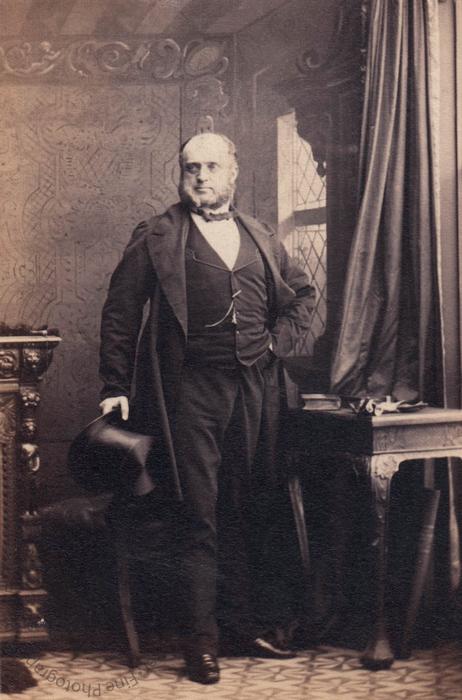J. P. Foster, Esq.
(1812-1878)
13 July 1862
Volume 8, page 242, sitting number 10,590.
[Identified as ‘J. P. Foster, Esq.’ in the Silvy daybooks, this is probably the retailer John Porter Foster.]
Born at Bolton in Cumberland on 1 October 1811, John Porter Foster was the son of John Foster and Isabella née Stamper. He was baptised at Bolton on 30 October 1811.
On 20 July 1837 at Holme Cultram Abbey in Cumberland 'Mr J. P. Foster, of Wood Street, London' married Jane Rigg, 'third daughter of Mr Samuel Rigg, of Abbey House' (Carlisle Journal, 22 July 1837).
He appears on the 1851 census living at Bolton House on Seven Sisters Road in Islington. He gave ‘Merchant’ as his profession.
Ten years later, the household had moved to Kensington. Foster described himself as a ‘Merchant and Wholesale Wharehouseman / Manufacturer [of] Drapery Goods.’
In 1871 he was a widower living with an unmarried daughter and five servants at Killhow in High Bolton, Cumberland. He was now the ‘Owner and Occupier of 624 acres / Employing 15 men labourers, / 4 women and 2 boys. Also Merchant / and Warehouseman in London.’
John Porter Foster ‘late of Wood-street Cheapside in the City of London and of Killhow in the County of Cumberland’ died at Killhow on 7 April 1878, leaving an estate valued at £30,000. He was 66 years old. His body lies amongst many of his ancestors in the churchyard of All Saints in the village of Boltongate, Cumberland.
An extensive obituary appeared in a local paper. ‘The announcement of the death of Mr J. P. Foster, of Killhow, which occurred at his own residence, at six o’clock on Sunday morning, will be received with general regret. Mr Foster was one of those successful Cumberland men who, having gone to the Metropolis to “seek their fortunes,” pushed their way into the front rank of the London merchants and then retired to their native county to spend the remainder of their days amid the pleasures of a country life and the happy cultivation of agricultural pursuits. The firm of Foster, Foster and Co., of which Mr J. P. Foster was for many years the senior partner, attained a world-known name for certain branches of drapery goods, and when he retired from it the concern was turned into a limited liability company with a degree of success which has not often attended enterprises of the kind. Before his retirement from the bustle and excitement of London commerce to the comparative repose of country life, Mr Foster had become a short-horn fancier, and he gradually collected at Killhow a herd of pedigree shorthorns which became famous in the north. This fancy was cultivated with still greater assiduity as by degrees Agriculture drew him away from her rival Commerce to whom he had devoted the earlier years of his life. In the bright green parks in the valley of the Ellen, within view of his stately mansion of Killhow, might always be seen some of the finest specimens of the Bates blood; and when the owner was there to point out the beauties of his favourites – not without a hint as to the great price he had paid for this calf or that promising heifer – the visitor felt he was in the company of one of the most genial and amiable of men. Mr Foster took a warm interest in the the promotion of improved agriculture in the district in which he lived. He was a liberal supporter of the Wigton Agricultural Society, to whose show-yard he was at one time a constant contributor; but which he latterly helped more effectually by giving a series of handsome prizes every year for the best shorthorns. […] For several years Mr Foster has been more or less of an invalid, and in winter much of his time was spent in the milder climate of the south of England; but during the past fortnight his illness had developed more serious symptoms, and on Sunday morning he died. Mr Foster was a county magistrate, and at the Quarter Sessions his business capabilities at once picked him out for the chairmanship of the Finance Committee. In the year 1875 he filled the office of High Sheriff. In politics he was an ardent Liberal, and in one of his last letters he expressed his deep interest in the proceedings of the West Cumberland Liberal Association. He leaves one son (Mr S. P. Foster) [Samuel Porter Foster] and one daughter, his wife having predeceased him by a few years’ (Carlisle Journal, 9 April 1878).
Killhow, his house in Cumberland, was demolished in 1926. ‘Among the accommodation were twelve best bed and dressing rooms, four maid-servants’ bedrooms, two bedrooms for men-servants, three bathrooms, a billiard room, wine cellars, five WCs inside and a WC outside. The house was built in the Scottish baronial style by John Porter Foster, founder of a London drapery firm, at a cost of £36,000, in 1865. By 1913 it was being considered for transformation into a sanatorium, but the scheme was not approved and demolition eventually followed’ (Ireby, Maureen Allen, 2004).

